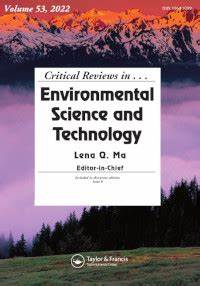Potential sources and occurrence of macro-plastics and microplastics pollution in farmland soils: A typical case of China
IF 11.4
1区 环境科学与生态学
Q1 ENVIRONMENTAL SCIENCES
Critical Reviews in Environmental Science and Technology
Pub Date : 2023-09-23
DOI:10.1080/10643389.2023.2259275
引用次数: 0
Abstract
AbstractPlastic debris (including macro-plastics, microplastics (MPs), and nanoplastics), defined as an emerging contaminant, has been proven to significantly affect soil ecosystem functioning. Accordingly, there is an urgent need to robustly quantify the pollution situation and potential sources of plastics in soils. China as the leading producer and user of agricultural plastics is analyzed as a typical case study to highlight the current situation of farmland macro-plastics and MPs. Our study summarized information on the occurrence and abundance of macro-plastics and MPs in Chinese farmland soils for the first time based on 163 publications with 728 sample sites. The results showed that the average concentration of macro-plastics, and the abundance of MPs in Chinese farmlands were 103 kg ha−1 and 4537 items kg−1 (dry soil), respectively. In addition, this study synthesized the latest scientific evidence on sources of macro-plastics and MPs in farmland soils. Agricultural plastic films and organic wastes are the most reported sources, indicating that they contribute significantly to plastic debris in agricultural soils. Furthermore, the modeling methods for quantifying macro-plastics and MPs in soils and estimating the stock and flow of plastic materials within agricultural systems were also summarized.Keywords: Abundancefarmland soilsmacro-plasticsmicroplasticsquantitative methodsource apportionmentHANDLING EDITORS: Hyunjung Kim and Jörg Rinklebe Disclosure statementThe authors report there are no competing interests to declare.Additional informationFundingThis research was supported by the National Natural Science Foundation of China under Grant [number 42277097]; the UKRI Global Challenges Research Fund (GCRF) and the Natural Environment Research Council project, “Do agricultural microplastics undermine food security and sustainable development in less economically developed countries?” under Grant [NE/V005871/1]; the International Cooperation and Exchange of the National Natural Science Foundation of China under Grant [NSFC-UNEP: 32261143459], and the High-level Team Project of China Agricultural University.农田土壤宏塑料和微塑料污染的潜在来源和发生:以中国为例
塑料垃圾(包括宏塑料、微塑料和纳米塑料)是一种新兴的污染物,已被证明对土壤生态系统功能有显著影响。因此,迫切需要对土壤中塑料的污染状况和潜在来源进行定量分析。以中国作为农用塑料的主要生产国和消费国为典型案例进行分析,突出农田宏观塑料和MPs的现状。本研究基于163篇论文和728个样点,首次总结了中国农田土壤中宏观塑料和MPs的发生和丰度信息。结果表明,中国农田宏观塑料的平均浓度为103 kg ha - 1, MPs丰度为4537项kg - 1(干土)。此外,本研究还综合了农田土壤中宏观塑料和MPs来源的最新科学证据。农业塑料薄膜和有机废物是报告最多的来源,表明它们对农业土壤中的塑料碎片贡献很大。此外,综述了土壤中宏观塑料和MPs的量化建模方法以及农业系统中塑料材料储量和流量的估算方法。关键词:丰度农田土壤微塑料定量方法来源分配处理编辑:Hyunjung Kim和Jörg Rinklebe披露声明作者报告无利益冲突。本研究得到国家自然科学基金项目资助[no . 42277097];UKRI全球挑战研究基金(GCRF)和自然环境研究委员会的项目“农业微塑料是否会破坏经济欠发达国家的粮食安全和可持续发展?”根据Grant [NE/V005871/1];国家自然科学基金国际合作与交流项目[NSFC-UNEP: 32261143459],中国农业大学高水平团队项目。
本文章由计算机程序翻译,如有差异,请以英文原文为准。
求助全文
约1分钟内获得全文
求助全文
来源期刊
CiteScore
27.30
自引率
1.60%
发文量
64
审稿时长
2 months
期刊介绍:
Two of the most pressing global challenges of our era involve understanding and addressing the multitude of environmental problems we face. In order to tackle them effectively, it is essential to devise logical strategies and methods for their control. Critical Reviews in Environmental Science and Technology serves as a valuable international platform for the comprehensive assessment of current knowledge across a wide range of environmental science topics.
Environmental science is a field that encompasses the intricate and fluid interactions between various scientific disciplines. These include earth and agricultural sciences, chemistry, biology, medicine, and engineering. Furthermore, new disciplines such as environmental toxicology and risk assessment have emerged in response to the increasing complexity of environmental challenges.
The purpose of Critical Reviews in Environmental Science and Technology is to provide a space for critical analysis and evaluation of existing knowledge in environmental science. By doing so, it encourages the advancement of our understanding and the development of effective solutions. This journal plays a crucial role in fostering international cooperation and collaboration in addressing the pressing environmental issues of our time.

 求助内容:
求助内容: 应助结果提醒方式:
应助结果提醒方式:


